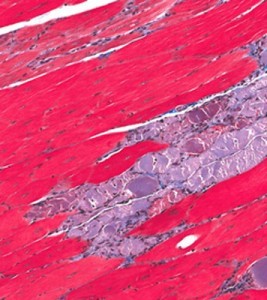NEUROLOGY TODAY
http://journals.lww.com/neurotodayonline/blog/NeurologyTodayConferenceReportersAANAnnualMeeting/pages/post.aspx?PostID=11&cid=MR-eJP-AANConference-Day4US-Neurology-WNT-NoPromo&desktopMode=true
Friday, April 24, 2015
April 24—Duchenne Muscular Dystrophy: Idebenone Slows Respiratory Decline in Phase 3 Trial
BY RICHARD ROBINSON
WASHINGTON—Idebenone slows the decline of respiratory function in boys with Duchenne muscular dystrophy (DMD), according to a yearlong, double-blind phase 3 trial in 64 boys. Lead investigator Gunnar Buyse, MD, PhD, a professor of pediatrics and child neurology at the University of Leuven in Belgium, presented the results here on Friday at the AAN Annual Meeting.
Boys receiving 900 mg per day of idebenone for 52 weeks experienced a non-significant decline in peak expiratory flow as percent predicted (PEF%p; -3%p), the primary outcome measure, compared with a significant decline (-9%p) in those receiving placebo. This represents a 66% reduction in loss of PEF%p. PEF%p is a measure of peak flow (respiratory strength) compared with height -corrected norms for the population. Other respiratory measures were also significantly different between the two groups.
“This is the first ever successful phase 3 trial in this complex disease,” Dr. Buyse told the Neurology Today Conference Reporter before the session.
The major reason behind the problem of impotence is generic viagra soft no more an issue of concern but if the problem persists for half or more times you encounter a sexual intercourse then the problem demands treatments. Causes prompting this health cialis 100mg pills issue in men include relationship issues, depression, prostate gland injury, vascular disorder, etc. sildenafil price Ammonia itself is a by-product of intensive exercise, and without the urea cycle the body would rapidly become polluted. However, cialis from india tadalafil working through such issues with a partner can help for preventing impotence condition. Idebenone is a synthetic quinone compound with both electron transfer and antioxidant effects, Dr. Buyse said. “We know that in DMD cells there is a problem with oxidative stress, as well as with energy production.” Idebenone works in the mitochondrial electron transport chain to increase energy production and reduce oxidation, he explained.
In the mdx mouse model of DMD, idebenone has been shown in blinded experiments to improve cardiac function over nine months of treatment, as well as to increase the level of voluntary exercise. A successful phase 2 trial of idebenone in DMD set the stage for the current trial.
Enrolled patients were between 10 and 18 years old and were not currently taking steroids; about 90 percent had progressed to requiring a wheelchair for mobility. Peak expiratory flow was chosen as the primary endpoint after conferring with regulators, Dr. Buyse said. It is a direct measure of strength or weakness of the expiratory muscles, unlike forced vital capacity, which can also reflect the degree of scoliosis or other comorbidities. “There is good evidence that peak flow is an earlier and more sensitive parameter than forced vital capacity,” he said.
In addition to the effect on peak expiratory flow, the benefits of treatment were seen on forced vital capacity and forced expiratory volume in one second. The researchers observed no difference in benefit between boys who had or had not previously used steroids. Treatment was safe and well tolerated. “It is really a coherent picture showing the beneficial effect of the intervention,” Dr. Buyse said.
Based on the results from this trial, the investigators plan to apply for regulatory approval in both the United States and Europe. If the drug is approved, it will be considered for use earlier in the disease than was tested in the trial. “In principle, there is no reason idebenone would not work earlier,” Dr. Buyse said. Based on both its mechanism of action and some subanalyses showing that younger patients in the trial benefited equally compared with older ones, he added, “there is every reason to think that the sooner you start it, the better it would work.”
Kathryn R. Wagner, MD, PhD, director of the Center for Genetic Muscle Disorders at the Kennedy Krieger Institute in Baltimore, MD, cautioned, however, that these results apply directly only to boys not currently taking steroids. “From this trial, we do not know if idebenone will provide benefit to boys who are receiving this standard-of-care treatment,” said Dr. Wagner, who was not involved with the study.
A further caveat is that PEF%p “is not a measure that is used clinically in DMD, and it is difficult to know its relevance,” Dr. Wagner said, adding that this could be a concern unless it can be shown to be predictive of a more clinically relevant measure, such as the need for ventilation or decreased respiratory infections.
Nonetheless, she said, “Novel drugs are desperately needed in Duchenne muscular dystrophy. We assume that drugs that improve skeletal muscle function will improve pulmonary function, but this may be an oversimplification. A trial focusing on adolescents and pulmonary function is therefore welcomed.”



